Everybody loves a bubble bath, show me a person who doesn’t and I’ll show you a liar. Bubbles are fun but for pool owners bubbles represent a time for panic. For us, bubbles are no longer the sign of fun in the sun and frolicking, they are a harbinger of doom. Ok, that was a little excessive but you get the point. A stream of bubbles is a sign of the unwanted presence of air within our pool’s plumbing system. This air is likely the cause of a sucking air leak from a pump, union or diverter gasket. The leaks and the air pockets they form will lower water pressure and greatly decrease the capacity of our filter system.
Knowing bubbles are bad is one thing but knowing where they are coming from and how to stop them is another. In this blog we will walk through the common culprits of pool air leaks and provide you tips on diagnosing your own system. Let’s begin!
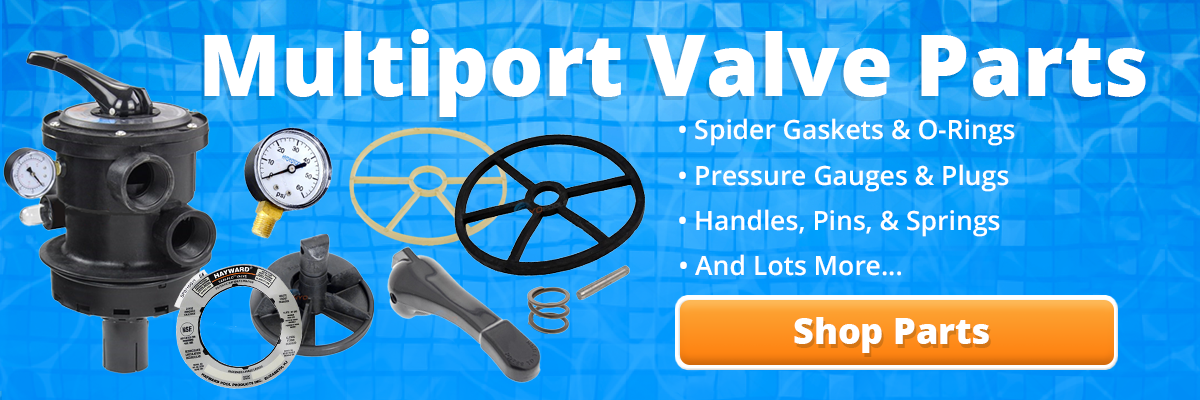
Fresh Air is Sometimes Bad
Bubbles streaming out of your return could be a result of low water levels in the skimmer. The optimal water level is halfway up the skimmer face plate. Most skimmers have four screw holes going up the face plate vertically; the optimal water level would be between the second and third screws. This will supply your skimmer with enough water to keep your pipes full and your pump happy.
If the pool requires refilling more often than usual then that might be a sign of a leak in the plumbing or the basin. Natural evaporation rates top out at a quarter of an inch even in the hottest of of temperatures. If you are unsure of your pool’s evaporation rate or water loss, we can use the Bucket Test to test for both. Even in hot temperatures like Florida or Texas, it is unlikely that the evaporation rate would rise above ¼”. To check your evaporation rate try the “Bucket Test.” Sounds fun, right?
The steps of the Bucket Test are as follows:
- Fill 5-gallon bucket with pool water until the water level is two to three inches from the top. Mark the fill line with a pencil.
- Mark the current water level of the pool with a piece of duct tape and Sharpie marker. Place five to seven inch piece of tape along the wall partially submerged in water. Mark the water level using the Sharpie on the tape. This prevents us from marking up the wall or liner.
- Set the bucket on the first step of your pool entry so it is partially submerged. On the second piece of tape mark the water level of the pool as it rises on the outside of the bucket.
- Wait 24 hours. Do not run pump during this test. Also keep animals away from bucket as they may drink from the bucket, skewing results.
- After 24 hours mark the current water level of both with the pencil.
- Measure the difference between the original measurements and the day after; if the measurements differ more than 1/4″ – 1/2″ you may have a leak
Pump Lid O-Rings
This little bugger can cause more trouble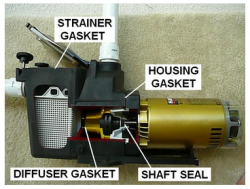 than it’s worth. Located on the strainer housing of the pump, it creates a vacuum lock seal for the pump housing to guarantee pump priming. If this o-ring is out of place it will allow air to seep in as the pump draws from the pool. A common byproduct of a bad lid-o-ring is cavitation (large pool air leak bubbles in strainer basket) or inability to prime itself.
than it’s worth. Located on the strainer housing of the pump, it creates a vacuum lock seal for the pump housing to guarantee pump priming. If this o-ring is out of place it will allow air to seep in as the pump draws from the pool. A common byproduct of a bad lid-o-ring is cavitation (large pool air leak bubbles in strainer basket) or inability to prime itself.
The need to empty the pump basket of debris is the number one cause of this o-ring getting out of shape. That type of maintenance is unavoidable so the best remedy is to treat it with care and freshly lube it after every strainer cleaning. Clean the groove of the o-ring before replacing to make sure it sits securely in place. If it is not properly seated in the groove it can become pinched and/or warped when tightening the strainer lid.
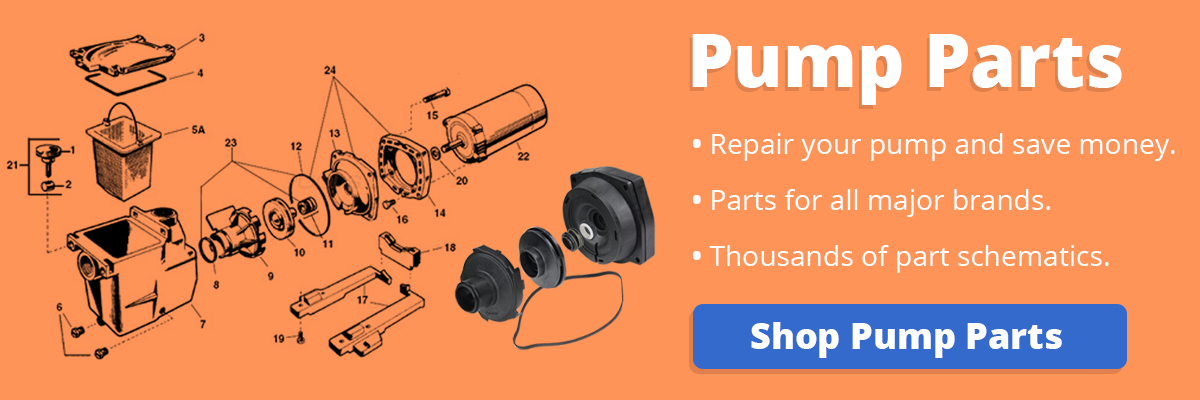
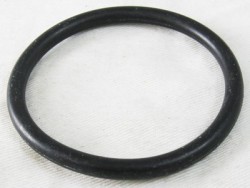 U-N-I-O-N, It’s a Union
U-N-I-O-N, It’s a Union
Pump and standard plumbing unions contain an o-ring to maintain the integrity of the joint. A good hint that a union is malfunctioning – if the o-ring is visible when the nut is removed, it is likely the source of air. The union o-ring should fit snugly into the groove of the union, out of view. Remove the gasket and place it on a flat surface to determine if it has retained its circular shape. If the gasket appears oblong or pinched, replace the gasket with a fresh one. Union gaskets are more rigid than your pump’s gaskets; once they become misshapen there is little chance of reforming them to the proper shape.
Diverter Valve O-Ring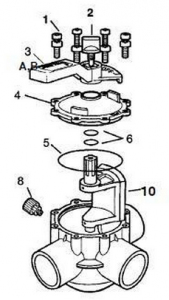
These can be tricky as a pool may have several valves feeding water to the pump. An air sucking valve is likely to prevent the pump from priming and create cavitation within the housing if it is able to prime at all. Pool technicians have become inventful attempting to source a sucking air leak from a valve. One of these cool tricks is using incense. Light a few sticks of incense and hold the stream of smoke close to the valve seams; if a sucking air leak is present, the smoke will be seen getting sucked into the valve.
For pumps having issues with priming, I would suggest using your garden hose to source the pool air leak. While your pump is circulating, run a steady stream of water over the suspect valves and its seams; if the pump is pulling air when water is applied to the leak it will block air from entering the system. When the leak is blocked by the water the pump should prime in a few seconds as long as there are no further leaks.
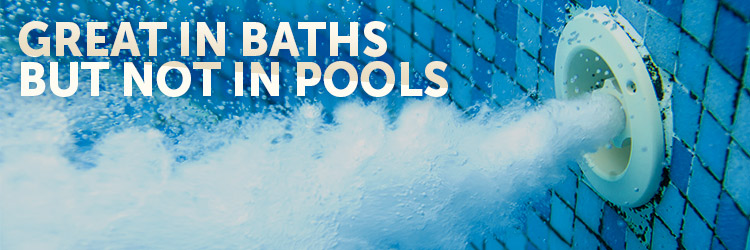
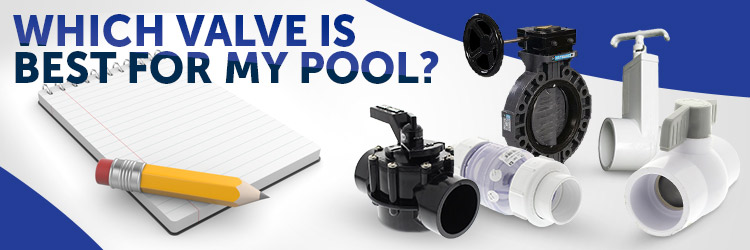
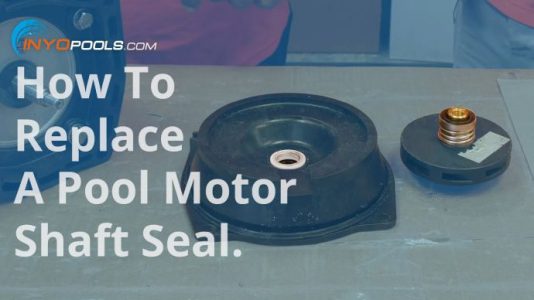








When pool is operating normally there is no air coming out of spa jets. When turning on spa valves to use spa jets to heat, getting air bubbles out one of the four wall jets. Could this be a check valve problem with the blower? Thanks.
The air blower’s job is to create air bubbles in the lines. So, if the air bubbles were coming out of all four jets before, but aren’t now then there is an issue there.
The grease cap on my Jandy diverter valve has fallen off/broke – the other part is still stuck in there. Could this be a cause of air leak into the pump? I know I have bubble coming out of the jet streams. Possibly I need to replace the O-rings too.
If the valve is on the suction side of the pump, yes it could be the cause of the air leak. Read and use the techniques shown in this guide to figure out where the leak is coming from: How to Find Suction Side Air Leaks In A Pool
I just replaced my Hayward 1 HP motor with a Hayward 1-1/2 HP pump/motor assembly because my above-ground Aqua-bug vacuum was not moving on the floor of the pool. It appeared that I was not getting enough pressure, and still am not getting enough pressure with the new pump. I noticed this problem last season, but it was not as bad as now. I also change my sand every year. Is it an air leak problem? I also noticed that my filter (sand reservoir) moves easily (it’s not as heavy as it used to be), when I try to turn the handle on the multi-port valve. The only part that I have not yet replaced is the Valve. Also, all of my hoses are new and the clamps are tight. My pool water is getting cleaned, etc., but the bug vacuum doesn’t work. And, I bought a new vacuum too, with no luck. Any suggestions? Thank you very much.
Okay, so you got a bigger pump, changed your sand, changed your plumbing hoses, tightened all the connections, got a new cleaner and I presume using new cleaner hoses and it still doesn’t work?
My advice is, ¯\_(ツ)_/¯. You can check the skimmer’s vacuum plate to see if it is making a seal. Outside of that, I am at a loss.
Thank you.
I just paid a lot of money to have an in ground vinyl pool (3X6X36) replaced with plaster. I’ve noticed that Bubbles are seeking out from ALL four jets returns a week after contractors completed the work. The two jets returns closest to the skimmer shows the most bubbles than the other two at the end by the steps. I have contacted the contractors to come back and find what’s exactly is the problem. But as you know, I have been getting the run-a-round with the contractors and it seems like this matter is headed to the courts. I’m tired of trying to deal with these people and getting no satisfaction. In the mean time, what can I do myself to solve this matter prior to having this matter dealt with legally?
It seems like your plumbing system has a sucking air leak(what the entire article above covers) which can be relatively easy to find and fix. We also have the following guides that show you how to troubleshoot the problem: How to Identify and Correct Air Leaks & How To Find Suction Side Air Leaks In Your Pool Using Smoke, Soapy Water, or Shaving Cream.
Because this is a pretty common issue in any type of pool, I do not think the plastering company was the cause of this problem. The purview of their job would not have them altering or disassembling the pipes or equipment that would cause an air leak of this nature.
I just paid a lot of money to have an in ground vinyl pool (3X6X36) replaced with plaster. I’ve noticed that Bubbles are seeking out from ALL four jets a week after contractors completed the job. The two jets closest to the skimmer (the shallow end of pool) shows a great deal of the most bubbles than by the other two at the end by the steps. I have contacted the contractors to come back and find what’s exactly is the problem. But as you know, I have been getting the run-a-round with the contractors and it seems like this matter is headed to the courts I’m tired of trying to deal with these people and getting no satisfaction. In the mean time, what can I do myself to solve this matter prior to having this matter death with legally
I had a phosphate issue and ran pump 48 hrs to remove with phos out product. Filter pressure was at 20 psi prior. Once the 48 hr. Period was completed I backwashed and rinsed as instructed. When I put back to filter position I could not get pump to prime without several attempts to get flow. Once I got flow the skimmer basket would not fill complete and once at 10psi. So today I cleaned filter and started pump again and still same 10psi and air bubbles from jets in pool.
Any suggestions?
pool is only 2 1/2 years old, started getting air bubbles coming out of all the jets in the pool a couple of months ago. when that started there was a gurgling sound coming from the sand filter where you turn the knob to backwash it. when pump is off there sounds to be a seeping noise coming from the lid on the pump.
It sounds like you’ve found at least one of the issues, the pump lid o-ring is sucking air. The air leak may also happen when the pump is running, but you can’t hear it over the noise of the motor. Your pump may be strong enough, or the leak isn’t severe enough (yet) to negate the pump’s ability to prime. I’d start with replacing the pump’s lid gasket, this will eliminate the most glaring issue, and you can pick off any others as they arise.
Hi
I have a Pentair Ulra-Flow pump that is approaching 18 years here in Miami, FL. I tracked the cause of air bubbles entring my pool from only one jet to the small drain plug in the pot directly in front of the volute. I used a magnifying glass to identify a crack where the female threads are in the the pot (where the drain plug screws into). Thinking it was the small O-ring, I changed it, used a O-ring lube, and still had air bubbles. I braced a running hose against the drain plug and within seconds every air bubble disappeared from under the clear lid, and zero bubbles entering the pool. Turned the hose off and the bubbles return. Since the crack is within the threaded portion of the drain plug, I figured I could get away with JB Marine weld putty for plastic on the outside of the pot. Before I throw down $18.00 (much less expensive than the pot), what is your opinion on this “fix”? I assume since the motor is pulling water into the pot the putty will cure and remain even tighter against the outside. Thank you. Adam Stuart
So here is my issue. I have a pool and hot tub run off the same pump. On pool mode works great no issues. As soon as i switch to spa mode i lose about 3 inches of water in the skimmer before the pump and it stays there. Pumping water and air. I can’t run my heater cause it shuts off automatically if air is in the line. The pump is shaking a little with the air in there. Switch it back to pool mode and works fine. I can’t find a leak above ground anywhere. Tried the smoke thing and the water hose running didn’t find anything. Would there be anything else i could do before i look underground for a leak.
Hello Jon – We actually cover this topic in one of our Poolside Chats, give it a look: Why is my spa draining when I turn off my pool pump?
My spa pump keeps cutting out after about 15 seconds. I loosened union to let air out then tightened and still 15 seconds and its turning itself off. I noticed a few bubbles still coming out is there any way to figure out if it’s a pump.problem or a air pocket problem?
It probably isn’t an air issue but more of a pump motor problem. I suggest reviewing any of the guides listed under this search link.
If it is your standard fiberglas shell self contained hot tub with a pipe issue, you should see some sort of leak when the pump is off. The pump and pipes are usually below the waterline, making leaks a telltale sign of loose connections or cracked pipes. Check the spa water level, to make sure the skimmer is gulping air due to not enough water.
Hello
Would appreciate your input. Losing water so I actually have a leak detection company come in and they found that it was in the step dra losing water so I actually have a leak detection company come in and they found that it was a crack in the jet in step . They repaired it and I elected to close off the Jets and the step with the black plugs like use for winter . Prior to their visit I never had air bubbles in the pool I now have air bubbles in the pool at first they thought it was because of the air they have to add to the system to check for leaks but that’s been a week ago Thursday and I still after I backwash get air bubbles . I just had a new sand filter put in because it was leaking out the backwash line because the spider valve was bad bad but that was the original sand filter which was 20 years old so I had the sandfilter replaced. Pump pressure ranges between 10 and 12 and since the repair of the water level has maintained . Any suggestions…?
I am having the same problems my wife hooked a vacuum to one of the skimmers and ever since two of our jets started blowing air bubbles whereas the others are working just fine but not as strong as they’re supposed to be we tried the incense trick but nothing happened please help
Did you disconnect the hose from the skimmer? The cleaner hose could have pinholes in it that are drawing air. You can check the hose sections by sealing the ends and submerging it. If you see air bubbles rising from the length of the pipe then that is your culprit.
You can also try using the air relief on the filter to release any trapped air after everything else checks out.
I bubbles blowing from one jet like it’s a hot tub. But the other jets aren’t blowing bubbles.
I am a new pool owner and have been dumbfounded lately with the presence of air bubbles in one of my jets. I have a one year old Hayward 1.5 hp pump on a 15,000 gallon pool. It has run without issues for the last year. But recently bubbles have appeared. Thus far I have replaced a (1) Pentair 3 way diverter valve and its o-rings (I discovered a hairline crack in it), (2) pump filter housing filter and gasket, and (3) strainer basket gasket, (4) checked for debris in the impeller. I have applied a light coating of silicon lube and made sure all fittings are hand tight. But the bubbles persist!
Interestingly after performing (1) above turning on the pump and bleeding the air from the filter housing the jet will pump water minus the air bubbles. However, 5-10 minutes later they reappear. I am not sure what to do next other than replacing the filter housing pressure gauge (it is old. Can it suck air?), replacing PVC plumbing and or replacing the diffuser o-ring.
Your advice is appreciated.
First I would make certain your water levels are correct. All skimmers and drains need enough water so they are always covered. If your water levels are dancing on the borderline of too low then any ebb and flow of water can mean a skimmer or ledge drain can scoop in some air.
Secondly, I would use the smoke trick. It is my favorite way of finding a sucking air leak. Light an incense stick to get a stream of smoke then run it along all the seams of your pool equipment and plumbing. Any sucking leak will pull in the smoke, pinpointing any problem areas.
When you are getting these air leaks, do you have pool cleaner or vacuum hose hooked to the skimmer or dedicated suction line? If so, you may have a pinhole in a hose or two causing the air leak. To find the air leak in a vac hose, seal the ends of the individual hose sections, then submerge it. If you see air bubbles coming from the hose body, replace it.
When i filter my pool, a single jet in my jacuzzi is blowing air/water and im seeing bubbles? What is a likely diagnosis?
We will need a little more info to figure out the issue. We may even need some pictures, so this may be a better question for Inyo’s Forum. I suggest posting pictures of your pool and filter plumbing, and the offending jet.
Also, we need to know if the jet is supposed to be on, or if it is closed but air and water are still flowing.
Thanks for sharing this information about how bubbles can appear in your spa jets. I had no idea that air could actually cause bubbles to appear in large amounts. Right now, my spa has a few bubbles, but I just thought that they were normal. However, I think I am going to try following your bucket test to see if there is a leak somewhere. It’s better to know now and get the problem fixed than to wait and waste water!
Sounds like a good plan. Thank you for reading.
THe picture above with the bubbles coming out of it. What kind of jet is that? Ours is just like that and I need to remove it from the pool. It is at the steps in the pool. Can you tell me know to get it out so I can screw a cap in its place?
The main image was a stock photo we pulled from a service so I do not know the exact jet type shown above, but I did some searching and found a possible match My best guess is the Hydro Air Mark II 10-5860. If this does not look like your jet I would suggest doing a thorough browse of our spa jet parts.